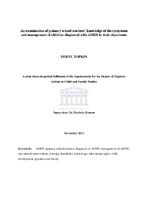| dc.description.abstract | There is a high rate of parental referrals by teachers to doctors for children who display symptoms of Attention Deficit Hyperactivity Disorder (ADHD). The symptoms are inattentiveness, impulse control, concentration problems and learning disabilities. Studies suggest that often a learning disability is mistaken for ADHD. ADHD is usually diagnosed from the age of seven, when children start their schooling. In some cases it is identified much earlier in the form of over-activity in children during the pre-school years. Teachers are responsible for creating an environment that is conducive to academic, social and emotional success for children with ADHD. Research suggests that mainstream primary school teachers
may lack knowledge regarding ADHD and evidenced-based classroom interventions. This study therefore intended to determine primary school teachers’ knowledge of the symptoms and management of children diagnosed with ADHD in their classrooms. A quantitative approach with a cross-sectional research design was used to conduct the study. A selfadministered questionnaire, the Knowledge of Attention-Deficit Disorder Scale (KADDS), which measures the misperceptions and understanding of the disorder, was used to collect data from a sample of 200 teachers at 28 public schools in Kimberley. The data was analyzed by making use of frequencies and mean scores. The data obtained was useful in describing
the knowledge base of teachers and in identifying the strategies that teachers mostly agreed to in managing children who have been diagnosed with ADHD in the classroom. The data was analysed by means of the Statistical Package for Social Sciences (SPSS). The results show that the majority of teachers are knowledgeable about the symptoms and diagnosis of ADHD but less so about the general associated features and treatment. Although the majority of teachers received training on ADHD, their knowledge about evidenced-based classroom interventions for ADHD can be improved. | en_US |

